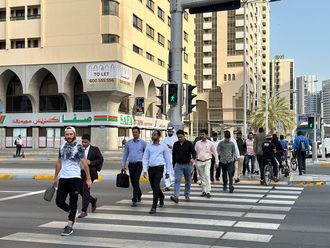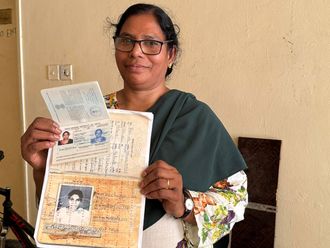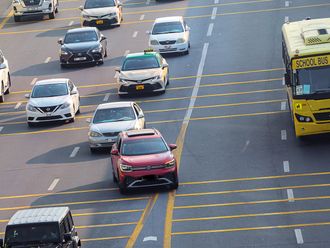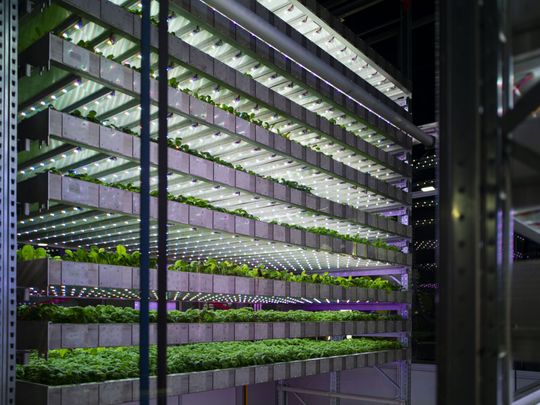
Dubai: Dubai’s Food Tech Valley has signed an agreement at COP28 with ReFarmTM to start construction on a game-changing ‘GigaFarm’ spanning 900,000 square feet.
The agreement was signed by Hesham Al Qassim, CEO of Wasl, and Oliver Christof, CEO of Cristof Global Impact, in the presence of Mariam bint Mohammed Almheiri, Minister of Climate Change and Environment; Mohammed Mousa Alameeri, Assistant Undersecretary of Food Diversity at the ministry; and Saeed Al Marri, Chairman of SSK Group.
The project will mark a global first which will see six complementary technologies co-located as part of a closed-loop circular waste-to-value system, establishing a self-contained ecosystem designed to maximise resource efficiency and prevent any waste going to landfill.
ReFarmTM, a joint-venture company between UAE-based SSK Group and UK-based Christof Global Impact (CGI), are set to start construction in mid-2024 at Dubai’s Food Tech Valley, a master development launched by His Highness Sheikh Mohammed bin Rashid Al Maktoum, Vice President and Prime Minister of UAE and Ruler of Dubai.
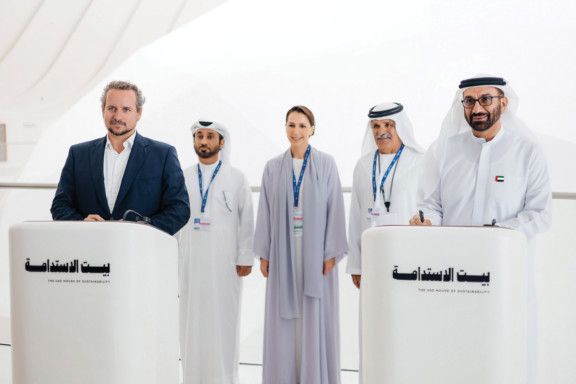
The project is led by major Dubai property developer, Wasl. A UAE-government-led initiative, Food Tech Valley aims to address food security locally, regionally, and globally. The ReFarmTM group of companies has been formed to own technologies and develop decarbonised food security projects deploying its own technologies in combination with complementary third-party solutions.
3,000 tonnes of produce
The site, which is set to be fully operational by 2026, will be capable of growing up to 3,000 tonnes of produce annually and recycling more than 50,000 tonnes of food waste, which support the UAE’s move towards decarbonising food production and replacing 1% of the country’s fresh produce imports with locally sourced items.
Read More
- COP28: Sheikh Mohammed bin Rashid inaugurates world’s biggest concentrated solar power project in Dubai
- UAE, Philippines explore ways to boost work-related collaboration
- UN climate chief urges negotiators at COP28 ‘to act rather than score points’
- COP28: MoHAP takes proactive role to protect human health from climate change
Reaffirming the UAE’s commitment to sustainability and climate action, Mariam bint Mohammed Almheiri said: “Technology and innovation are potent tools in our fight against climate change. If we are to be successful in keeping the global 1.5 degrees pledge within reach, we need a sustainable and regenerative approach to food systems and resource management. As holder of the COP28 Presidency, the UAE has put food security at the top of the agenda and, so far, has secured the endorsement of 134 countries for the UAE Declaration on Sustainable Agriculture, Resilient Food Systems, and Climate Action. The Food Tech Valley project is a pioneering example of how we can use innovation such as incubators for advanced farms — including indoor and vertical farms — to ensure global food security. The announcement of a new partnership to build a GigaFarm in the UAE’s Food Tech Valley is another important step towards a greener future.”
Food security
Hesham Abdulla Al Qassim, Group CEO, Wasl, said: “The UAE has the ambition and vision to lead the conversation on food security and take the actions necessary to achieve resilient communities. This project reflects our proactive action-oriented approach to the monumental challenge of food insecurity facing the world. This is one of many transformative projects which is set to be part of Food Tech Valley, which will have a significant impact on the UAE’s food security, maximising the use of precious resources and decarbonising the food supply chain. We look forward to working with our partners to make it a success.”
Ciruclar approach
Saeed Al Marri, Chairman at SSK Group of Companies, commented: “Our circular approach contributes to wider ambitions of food security and landscape regeneration. Additionally, no mains or groundwater connection will be required to grow fresh produce since water will be recovered as a by-product from the organic-waste-to-value technology and fed into the vertical farm, which is up to 98% more water-efficient than growing in a field.
Game-changer
Oliver Christof, CEO at Christof Global Impact (CGI), commented: “What has been achieved over the past 36 months on the ground in the UAE, is a game-changer for the sustainable food industry. A key factor for success has been the open mindset by the UAE leadership in relation to future technologies and a strong focus on circularity, which allowed us to bring together various groups, including local stakeholders, alongside our technologies, making the project appealing to local as well as institutional investors, while offsetting massive amounts of CO2.”


